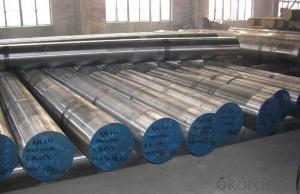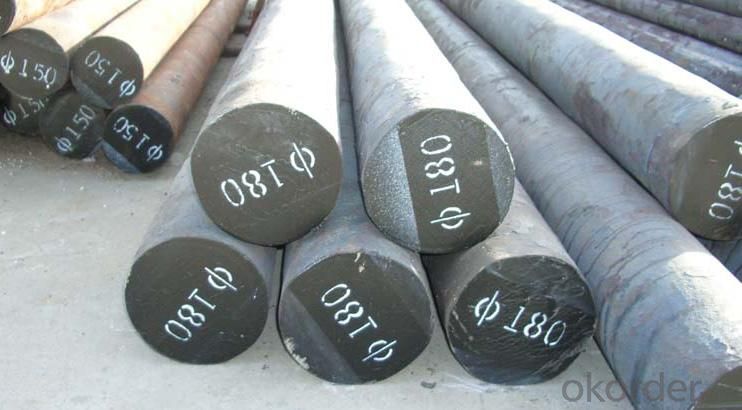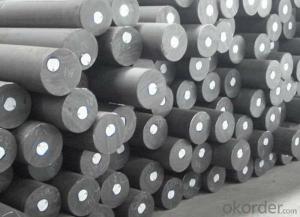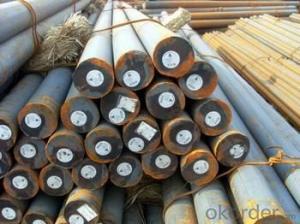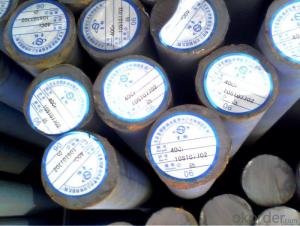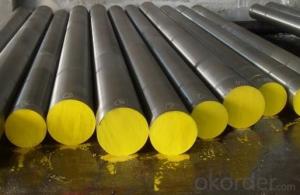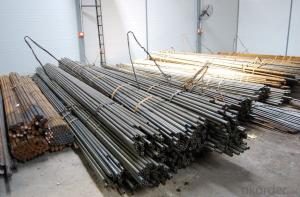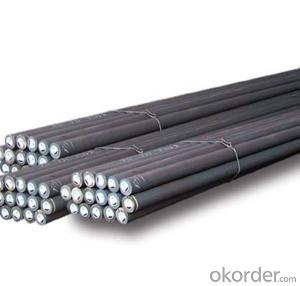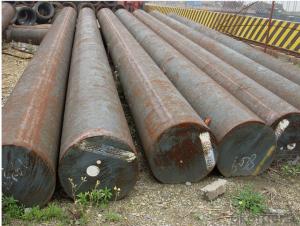Special Steel 1.2363 Mould Steel Bar / SAE A2 Steel
- Loading Port:
- China main port
- Payment Terms:
- TT or LC
- Min Order Qty:
- 25 m.t.
- Supply Capability:
- 10000 m.t./month
OKorder Service Pledge
OKorder Financial Service
You Might Also Like
Specification
The details of our Steel
1. Produce Standard: as the GB, AISI, ASTM, SAE, EN, BS, DIN, JIS Industry Standard
2. Produce processes: Smelt Iron -EAF smelt Billet - ESR smelt Billet -Hot rolled or forged get the steel round bar and plate
3. Heat treatment:
Normalized / Annealed / Quenched+Tempered
4. Quality assurance:
All order we can received Third party inspection, You can let SGS, BV,.. and others test company test and inspect our products before Goods shipping.
Product information
Chemical Composition(%) of SAE A2 steel | C | Si | Mn | S | P | Cr | Mo | V |
0.90-1.05 | 0.20-0.40 | 0.40-0.70 | ≤0.035 | ≤0.035 | 4.80-5.50 | 0.90-1.20 | 0.10-0.30 | |
Specification of SAE A2 steel | hot rolled: Dia.*L=14~50mm*2000~5000mm cold drawn: Dia.*L=3~20mm*2000~5000mm forged: Dia.*L=60~300mm*2000~5000mm | |||||||
Characteristic of SAE A2 steel | 1.good machinability and abrasivity 2.good hardness | |||||||
Application of SAE A2 steel | 1.Precision Stamping Dies 2.Precison Blanking Dies of wire cutting process, and stamping dies for various uses 3.Tools for plactic deformation of hard processing material 4.Dies for forging, deep drawing and thread rolling 5.High speed blanking punch,stainless plates punch 6.Tensile modulus, crimping die, embossing dies, wear plastic molding mold | |||||||
Heart Treatment of SAE A2 steel | 1.Quench: 940-960°c oil cooling 2.Tempering temperature: 210~240 °C 3. Hardness: 61HRC | |||||||
Melting Process of SAE A2 steel | 1. EAF: Electric Furnace+LF+VD(Optional) 2. ESR: Electric Furnace+LF+VD+Eleroslag Remelted(Optional) | |||||||
Main product
Plastic Mould Steel
DIN 1.2311,1.2738,1.2083,1.2316 etc.
AISI P20,P20+Ni,420 etc.
JIS SUS420J2
Hot Work Steel
DIN 1.2344,1.2343,1.2367,1.2365,1.2581,1.2713 etc.
AISI H13,H11,H10,H21, etc.
JIS SKD61,SKD6,SKD5,SKT4 etc.
Cold Work Steel
DIN 1.2739, 1.2601, 1.2080, 1.2436, 1.2631, 1.263, 1.2510, 1.2327 etc.
AISI D2, D5, D3, D6, A8, A2, O1 etc.
JIS SKD10, SKD11, SKD1, SKS3 etc.
High Speed Steel
DIN 1.3343, 1.3243, 1.3247, 1.3355 etc.
AISI M2, M35, M42, T1 etc.
JIS SKH51, SKH35, SKH59, SKH2 etc.
Alloy Structural Steel
DIN 1.7035,1.6511,1.7220,1.7225 etc.
AISI 5140, 4340, 4135, 4140 etc.
JIS SCr440,SNCM439,SCM435,SCM440 etc.
Stainless & Carbon Steel or Others
DIN 1.4125,1.1191 etc
AISI 440C,1045, 1020 etc.
JIS SUS440C,S45C etc
Product show

Workshop show

Shipping
1. FedEx/DHL/UPS/TNT for samples, Door-to-Door;
2. By Air or by Sea for batch goods, for FCL; Airport/ Port receiving;
3. Customers specifying freight forwarders or negotiable shipping methods!
Delivery Time: 3-7 days for samples; 5-25 days for batch goods.
Payment Terms
1.Payment: T/T, L/C, Western Union, MoneyGram,PayPal; 30% deposits; 70% balance before delivery.
2.MOQ: 1pcs
3.Warranty : 3 years
4.Package Informations: 1) EXPORT, In 20 feet (GW 25 ton) or 40 feet Container (GW 25 ton)
2)as customer's requirement
Why choose us?
(1) The leading exporter in China special steel industry.
(2) Large stocks for various sizes, fast delivery date.
(3) Good business relationship with China famous factories.
(4) More than 7 years steel exporting experience.
(5) Good after-sales service guarantee.
- Q: What are the different heat treatment processes for special steel?
- Some of the different heat treatment processes for special steel include annealing, quenching and tempering, hardening, case hardening, and precipitation hardening.
- Q: What are the different types of mold steel?
- There are several different types of mold steel used in various industries, including P20, H13, 420, 440C, and S7. These steels have different properties and strengths, making them suitable for specific mold applications such as injection molding, blow molding, and extrusion.
- Q: What are the properties of magnesium alloys?
- Magnesium alloys exhibit a combination of desirable properties, including low density, high strength-to-weight ratio, good corrosion resistance, excellent machinability, and high thermal conductivity. They also possess good damping capacity, making them suitable for applications requiring vibration reduction. Additionally, magnesium alloys can be easily cast, forged, and welded, allowing for a wide range of manufacturing processes. However, they are prone to ignite under certain conditions and can be more expensive compared to other metals.
- Q: How does special steel meet the requirements of specific industries?
- Special steel meets the requirements of specific industries by offering superior mechanical properties, corrosion resistance, and heat resistance, which are essential for various applications. Its tailored composition and precise manufacturing processes ensure the steel can withstand extreme conditions, such as high temperatures, pressure, and harsh environments. Additionally, the versatility of special steel allows for customization to meet specific industry needs, resulting in enhanced performance, durability, and overall efficiency.
- Q: Can special steel be used in the aerospace defense industry?
- Yes, special steel can be used in the aerospace defense industry. Special steel alloys such as high-strength steels, stainless steels, and nickel-based alloys are commonly utilized in the production of various components and structures for aerospace defense applications. These materials offer excellent mechanical properties, corrosion resistance, and durability, making them suitable for critical applications in the aerospace defense industry.
- Q: What are the different machining techniques for special steel?
- There are several machining techniques that can be used for special steel, depending on the specific requirements and characteristics of the steel. Some common machining techniques include turning, milling, drilling, grinding, and broaching. Each technique has its own advantages and is chosen based on factors such as the desired shape, size, and surface finish of the steel component. Additionally, advanced techniques like electrical discharge machining (EDM) and laser cutting can be employed for special steel, offering precise and efficient machining solutions.
- Q: What are the quality control measures for special steel?
- The quality control measures for special steel typically include thorough inspection and testing of raw materials, monitoring and controlling the manufacturing process, conducting various mechanical and chemical tests, ensuring dimensional accuracy and surface finish, and conducting final inspection and certification to meet specific industry standards. These measures are essential to ensure the desired properties and performance of special steel, as well as to meet customer requirements and ensure product reliability and safety.
- Q: What are the different types of bearing steel?
- There are several different types of bearing steel, including high carbon chromium bearing steel, high carbon high chromium bearing steel, and high carbon chromium molybdenum bearing steel.
- Q: What is the tensile strength of special steel?
- The tensile strength of special steel can vary depending on its specific composition and manufacturing process. However, special steel is generally known for its high tensile strength, often exceeding 1000 MPa (mega pascals), making it suitable for applications requiring strong and durable materials.
- Q: What is the purpose of cold drawing in special steel production?
- The purpose of cold drawing in special steel production is to improve the mechanical properties and dimensional accuracy of the steel. Cold drawing involves pulling the steel through a die at room temperature, which reduces the cross-sectional area and increases the length of the steel. This process helps to refine the microstructure of the steel, resulting in improved strength, hardness, and toughness. Additionally, cold drawing can enhance the surface finish and straightness of the steel, ensuring precise dimensions and making it suitable for various applications where high-quality steel is required. Overall, cold drawing plays a crucial role in enhancing the performance and quality of special steel, making it more reliable and efficient in various industrial sectors.
Send your message to us
Special Steel 1.2363 Mould Steel Bar / SAE A2 Steel
- Loading Port:
- China main port
- Payment Terms:
- TT or LC
- Min Order Qty:
- 25 m.t.
- Supply Capability:
- 10000 m.t./month
OKorder Service Pledge
OKorder Financial Service
Similar products
Hot products
Hot Searches
Related keywords
